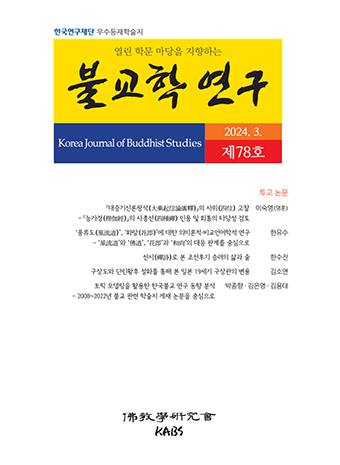Abstract
References
Sorry, not available.
Click the PDF button.
Information
The emergency of Buddhism as a philosophy in modern Korea was an event that tried to align ancient Buddhist teaching with European enlightenment ideas on human rights. The Buddhist philosophy of that time predicated on the Western metaphysics and the German idealism. It accepted the metaphysical formula of appearance and reality, and understood the deployment of Buddhist doctrine as a development in idealist teaching. The theoretical background of this tendency was the Japanese idealism that began to emerge in Meiji, Japan. Among them, Inoue Enryō’s influence was especially noteworthy. He imagined a system of absolute idealism that overcame the binary opposition between matter and spirit. He considered the notion of ’suchness’ as an immaterial, absolute entity. It was both the base and the abyss of differential beings. Inoue tried to provide a philosophical explanation of the Japanese emperor or the state through this system. The Buddhist philosophy of colonial Korea also accepted the theory of the ’dependent arising of suchness;’ that is, the absolute in its causative or relative condition, from thereupon moved in an extremely political direction.
근대 한국 불교계에서 시도한 불교 철학화는 불교가 근대적 시민 권을 획득하는 과정에서 일어난 하나의 사건이다. 당시 제기된 불교 철학은 서구 형이상학과 독일 관념론을 철학적 기반으로 했다. 현상 과 실재라는 형이상학의 도식을 수용했고, 불교교리 전개를 관념론 의 발전사로 이해했다. 그런데 이런 경향은 일본 메이지시대에 형성되기 시작한 일본 관 념론 철학을 이론적 바탕으로 한다. 특히 이노우에 엔료의 영향이 컸다. 그는 물질과 정신이라는 이원론적 도식을 극복한 절대관념론 체계를 상상했다. 그는 불교의 진여 개념을 비물질적인 절대적 실체로 간주했다. 그 것은 차별적인 존재자의 기반이자 심연으로 취급됐다. 이노우에는 그것으로 천황이나 국가를 철학적으로 설명하려 했다. 식민지 조선 의 불교철학도 저런 진여연기론을 수용하면서 대단히 정치적인 방 향으로 흘러갈 수밖에 없었다.
Click the PDF button.
- Publisher :Korean Association of Buddhist Studies
- Publisher(Ko) :불교학연구회
- Journal Title :Korea Journal of Buddhist Studies
- Journal Title(Ko) :불교학연구
- Volume : 21
- No :0
- Pages :339 ~ 379


 Korea Journal of Buddhist Studies
Korea Journal of Buddhist Studies






